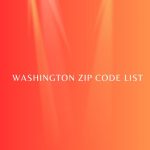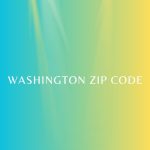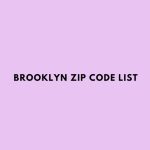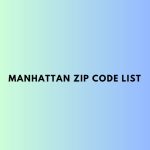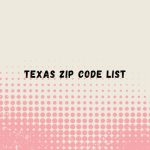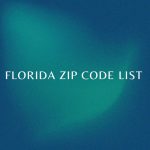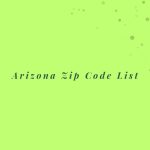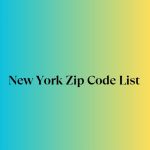Introduction
Navigating the vibrant and bustling state of New York can be simplified with a good understanding of its zip codes. These codes are more than just numbers; they help in organizing regions, facilitating mail delivery, and influencing various aspects of daily life, from real estate to school districts. Whether you are a resident, a business owner, or a visitor, knowing the zip codes can provide you with valuable insights into the state’s diverse areas.
Understanding Zip Codes
What is a Zip Code?
Zip codes, short for “Zone Improvement Plan” codes, are numerical codes assigned to specific regions to streamline mail delivery. Introduced in 1963 by the United States Postal Service (USPS), these codes have evolved to play significant roles in various aspects of urban planning, logistics, and demographics.
History and Evolution of Zip Codes
The zip code system was initially created to make mail delivery more efficient and reduce errors. Over time, it has become a crucial part of address systems across the country, aiding in everything from emergency services to marketing strategies. Zip codes can indicate specific neighborhoods, rural areas, or even individual buildings in densely populated cities.
New York’s Major Boroughs and Their Zip Codes
Manhattan
Manhattan, the heart of New York City, is known for its iconic skyline and bustling streets. Key zip codes here include 10001 (Chelsea), 10011 (Greenwich Village), and 10022 (Midtown East).
Brooklyn
Brooklyn, famous for its cultural diversity and artistic vibe, has significant zip codes like 11201 (Brooklyn Heights), 11215 (Park Slope), and 11221 (Bushwick).
Queens
Queens, the largest borough in terms of area, features zip codes such as 11101 (Long Island City), 11368 (Flushing), and 11418 (Richmond Hill).
The Bronx
The Bronx, known for its rich history and vibrant communities, includes zip codes like 10451 (South Bronx), 10471 (Riverdale), and 10475 (Co-op City).
Staten Island
Staten Island, with its suburban feel, encompasses zip codes such as 10301 (St. George), 10314 (New Springville), and 10312 (Huguenot).
Manhattan Zip Codes
Lower Manhattan
Lower Manhattan includes the Financial District (10004, 10005) and the trendy neighborhoods of Tribeca (10007) and SoHo (10013).
Midtown Manhattan
Midtown Manhattan, the commercial hub, is covered by zip codes like 10018 (Garment District), 10019 (Hell’s Kitchen), and 10036 (Times Square).
Upper Manhattan
Upper Manhattan, known for its cultural landmarks, features zip codes such as 10025 (Upper West Side) and 10029 (East Harlem).
Brooklyn Zip Codes
Northern Brooklyn
Northern Brooklyn includes hip areas like Williamsburg (11211) and Greenpoint (11222).
Central Brooklyn
Central Brooklyn, home to diverse communities, features zip codes like 11216 (Bedford-Stuyvesant) and 11225 (Crown Heights).
Southern Brooklyn
Southern Brooklyn encompasses neighborhoods such as Bay Ridge (11209) and Coney Island (11224).
Queens Zip Codes
Western Queens
Western Queens includes zip codes like 11101 (Long Island City) and 11103 (Astoria), known for their vibrant nightlife and diverse dining options.
Central Queens
Central Queens features areas like Forest Hills (11375) and Rego Park (11374), known for their residential charm and shopping districts.
Eastern Queens
Eastern Queens includes neighborhoods such as Jamaica (11432) and Hollis (11423), known for their rich cultural history and suburban feel.
The Bronx Zip Codes
South Bronx
South Bronx, an area undergoing revitalization, includes zip codes like 10451 and 10454.
Central Bronx
Central Bronx features neighborhoods such as Fordham (10458) and Belmont (10457), known for the Bronx Zoo and Arthur Avenue.
North Bronx
North Bronx includes more suburban areas like Riverdale (10471) and Woodlawn (10470).
Staten Island Zip Codes
North Shore
North Shore includes the historic neighborhood of St. George (10301) and the waterfront area of Stapleton (10304).
Mid-Island
Mid-Island features zip codes like 10314 (New Springville) and 10306 (Dongan Hills), known for their residential neighborhoods and shopping centers.
South Shore
South Shore includes suburban communities like Huguenot (10312) and Tottenville (10307).
Popular Tourist Destinations and Their Zip Codes
Times Square
Times Square, one of the world’s busiest pedestrian areas, is located in the zip code 10036.
Central Park
Central Park spans multiple zip codes, including 10024 (Upper West Side) and 10028 (Upper East Side).
Statue of Liberty
The Statue of Liberty is located in the zip code 10004.
Business and Economic Hubs
Key Zip Codes for Businesses
Key business zip codes include 10001 (Chelsea), 10017 (Midtown East), and 10022 (Upper East Side).
Financial District
The Financial District, home to Wall Street, is covered by zip codes 10004 and 10005.
Real Estate Insights Based on Zip Codes
High-Value Residential Areas
High-value residential areas include zip codes like 10021 (Upper East Side), 10023 (Lincoln Square), and 11201 (Brooklyn Heights).
Up-and-Coming Neighborhoods
Emerging neighborhoods with growth potential include zip codes like 11101 (Long Island City) and 11211 (Williamsburg).
Zip Codes and School Districts
How Zip Codes Affect School Zones
Zip codes determine school zoning, impacting the quality of education available. Areas like 10023 (Upper West Side) are known for their excellent school districts.
Top School Districts in New York
Highly regarded school districts are often found in zip codes such as 10024 (Upper West Side) and 11105 (Astoria).
Healthcare Facilities and Zip Codes
Major Hospitals and Their Locations
Key zip codes for healthcare facilities include 10016 (NYU Langone Medical Center) and 10021 (Weill Cornell Medical Center).
Healthcare Accessibility in Different Zip Codes
Access to healthcare varies, with urban areas typically having more facilities compared to suburban or rural regions.
Transportation and Zip Codes
Major Highways and Zip Codes
Zip codes along major highways include 10465 (Throggs Neck) and 10301 (St. George), facilitating travel across the city.
Public Transport Accessibility
Urban zip codes like 10036 (Times Square) offer extensive public transportation options, including subways and buses.
Climate and Weather Patterns by Zip Code
Coastal vs. Inland Weather
Coastal zip codes like 11697 (Rockaway Park) experience different weather patterns compared to inland areas like 10029 (East Harlem).
Seasonal Variations
Seasonal weather variations can be observed across different zip codes, influencing lifestyle and housing choices.
Conclusion
Understanding New York’s zip codes is essential for navigating its diverse and dynamic landscape. From the bustling streets of Manhattan to the suburban feel of Staten Island, each zip code tells a unique story. Whether you’re a resident, a business owner, or a visitor, this guide provides valuable insights into the Empire State’s geographical and cultural richness.
FAQs
How are zip codes assigned in New York? Zip codes are assigned based on the region’s population density, geographical boundaries, and the need for efficient mail delivery.
What are the most expensive zip codes in New York? Some of the most expensive zip codes include 10021 (Upper East Side), 10023 (Upper West Side), and 11201 (Brooklyn Heights).
How can I find the zip code for a specific address in New York? You can find a specific zip code by using online tools such as the USPS Zip Code Lookup or by searching the address on mapping services like Google Maps.
Are there any zip codes unique to certain communities in New York? Yes, places like Roosevelt Island have unique zip codes, such as 10044, that denote specific communities.
How often do zip codes change in New York? Zip codes can change based on urban development and population shifts, though significant changes are relatively infrequent and managed by the USPS.


